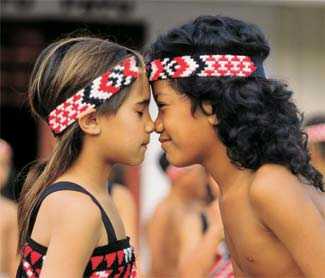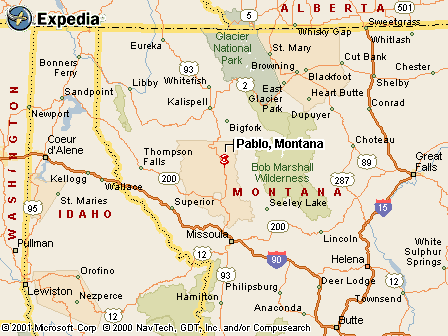|
|
Canku Ota |
|
|
(Many Paths) |
||
|
An Online Newsletter Celebrating Native America |
||
|
March 20, 2004 - Issue 109 |
||
|
|
||
|
Tribal Ambassadors Off to New Zealand |
||
|
by B.L. Azure - Char-Koosta
News
|
||
|
credits: Maori
Children
|
|
Eldina Bear Don't Walk and Terry Tanner will return from New Zealand on March 21. Bear Don't Walk will be conducting fundraisers to help defray costs of the trip. She and others will be selling raffle tickets for, among other things, a star quilt, jewelry, ceramic statues and baby bundles. She is also seeking donations of gifts that she will present to the Maori people. For more information, call her at 406-824-2117. Bear Don't Walk will be staying in a Maori village and discuss international law and language preservation. "The Maori have a head start on us in those areas," she said. The American Indian Ambassador Program has been in existence for 10 years. Each year up to 16 participants are selected from a national pool of applicants. The Ambassadors represent a cross section of the American Indian population. Both urban and reservation-based individuals are selected. Program selectors attempt to build a class of diverse individuals through a selection matrix that accounts for gender, regional, tribal, social, educational and professional consideration. An array of professions is usually represented in each class, including law enforcement, health, public administration, the arts, business, telecommunications, education and tribal governance. Each participant must take on a "community project," Bear Don't Walk said. Bear Don't Walk, a lawyer, said she her project is to get more Indian people into law schools. "There are a lot of lawyers but not a lot of Indian lawyers," she said. "There needs to be more of them and I want to help them get into law school." Bear Don't Walk said she visits high school classes and informs the students of the need for Indian lawyers, where they may attend law school and discusses the intricacies of federal Indian law, including treaty law. "I discuss how the law affects them and I engage them -- Indian and non-Indian students -- in discussions. Many of them don't know about Indian sovereignty and how it affects their every-day lives." Bear Don't Walk, who spends two to three hours with students in schools, said she is surprised what the students do know and what they don't know. They understand the basic concepts of treaties and how they may affect hunting and fishing on and off reservations but really don't grasp the overall legal aspects and their importance to tribal sovereignty. "Once we start to talk to them they are really interested in knowing more," she said. "I challenge the Indian students to take the non-Indian perspective and the non-Indian to take the Indian perspective. It helps them discuss the issue better and more rationally if they can see the other side." Because of its national reputation and stature, Americans for Indian Opportunity can recruit skilled leaders to engage the Ambassadors in discussions and interactive sessions. From tribal elected officials and directors of national organizations to members of the United States Congress, and the President's Cabinet, the Ambassadors are exposed to many different leadership styles and levels of influence. Furthermore, the Ambassadors meet and talk with Indigenous leaders from throughout the world and representatives of the international community. |
|
|
www.expedia.com |
|
|
||
|
|
||
| Canku Ota is a free Newsletter celebrating Native America, its traditions and accomplishments . We do not provide subscriber or visitor names to anyone. Some articles presented in Canku Ota may contain copyright material. We have received appropriate permissions for republishing any articles. Material appearing here is distributed without profit or monetary gain to those who have expressed an interest. This is in accordance with Title 17 U.S.C. Section 107. | ||
|
Canku Ota is a copyright © 2000, 2001, 2002, 2003, 2004 of Vicki Lockard and Paul Barry. |
||
 |
 |
|
|
The "Canku Ota - A Newsletter Celebrating Native America" web site and its design is the |
||
|
Copyright © 1999, 2000, 2001, 2002, 2003, 2004 of Paul C. Barry. |
||
|
All Rights Reserved. |
||
 PABLO
-- Two members of the Confederated Salish and Kootenai Tribes will
be going to New Zealand March 9 as a part of the American Indian
Ambassador Program.
PABLO
-- Two members of the Confederated Salish and Kootenai Tribes will
be going to New Zealand March 9 as a part of the American Indian
Ambassador Program. 